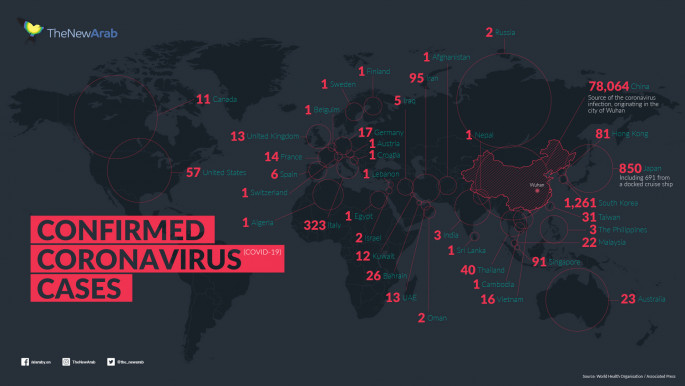Coronavirus-hit Iran slaps curbs on travel, shrine visits
Iranian authorities on Wednesday announced domestic travel restrictions for people with confirmed or suspected cases of the novel coronavirus, which has claimed 19 lives in the country - the highest tally outside China where the disease originated.
The authorities also slapped curbs on visits to major Muslim pilgrimage sites.
"Instead of quarantining cities, we are going to implement movement restrictions for those suspected of infection or those infected," Health Minister Saeed Namaki said at a news conference.
He said teams of inspectors had already been placed at the entrance of cities "that see a lot of movement", without naming them.
The teams will take people's temperatures and stop those who are infected or suspected of infection, who will be quarantined for 14 days.
Namaki said access to several Shia holy sites would be restricted, including the Imam Reza shrine in Mashhad and the Fatima Masumeh shrine in Qom.
Iran last week announced its first two deaths from the coronavirus in the Shia holy city of Qom, a key centre for Islamic studies and pilgrims from abroad.
Read more: How the Middle East is dealing with coronavirus
According to official figures, the virus has killed a further 17 people out of 139 confirmed cases of infection. Among those who have tested positive for the novel coronavirus are Iran's deputy health minister and a prominent reformist politician.
 |
| [Click to enlarge] |
Visitors to the shrines will be allowed to visit on condition they are provided "with hand-washing liquids, proper [health] information, masks", the minister said.
They must "not gather together in groups but just pray and leave", he said.
In affected areas, school closures will be extended for three days, and universities for another week starting from Saturday, he said.
Weekly Friday prayers will also be suspended in those regions, Namaki said.
"All of these decisions are temporary and if the situation changes, we might intensify or ease them," Namaki added.
Apart from school closures, sporting events have been cancelled and teams of sanitary workers deployed to disinfect buses, trains and public spaces.
Fears over cover-up
International health experts have expressed concern about Iran's handling of the outbreak, while critics of the government have speculated Tehran is covering up the true number of fatalities.
|
|
An Iranian lawmaker hailing from Qom earlier this week alleged that 50 people had died from the virus in the city alone.
Such worries mounted on Tuesday when the head of the taskforce combatting the virus, Deputy Health Minister Iraj Harirchi, admitted he himself had been infected.
But health ministry spokesman Kianoush Jahanpour said Wednesday that the situation was "improving", even as he announced four more deaths and 44 new infections including in six previously unaffected provinces.
Paris-based media watchdog Reporters Without Borders (RSF) on Wednesday said that Iran "seems to be concealing information about the epidemic in line with China's example".
It condemned what it termed "Iran's persecution of media outlets and journalists publishing independent information".
"Respect for the public's right to full, independent, diverse and quality news reporting... is the best way to protect the population and combat rumours," said Reza Moini, head of the group's Iran desk.
A day earlier, US Secretary of State Mike Pompeo accused Iran of concealing the full extent of the outbreak, saying "Tehran may have suppressed vital details".
But the Iranian health ministry's spokesman appeared optimistic on Wednesday about the situation in the worst-hit province of Qom, despite its spread across the Islamic Republic.
"Every 24 hours, at least 10 percent of those hospitalised or suspect cases are discharged with good general health," the official said.
Follow us on Facebook, Twitter and Instagram to stay connected





 Follow the Middle East's top stories in English at The New Arab on Google News
Follow the Middle East's top stories in English at The New Arab on Google News

![Israeli forces ordered bombed Gaza's Jabalia, ordering residents to leave [Getty]](/sites/default/files/styles/image_330x185/public/2176418030.jpeg?h=a5f2f23a&itok=_YGZaP1z)
